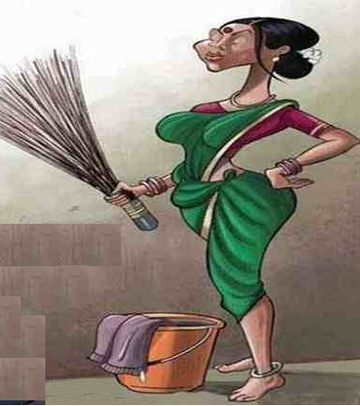Keeping “The Other Woman”
Nandini kept an eye on the clock while preparing the teaching plan for her English Communication class scheduled for 10 o’clock. The sink was full of dirty utensils. The house looked like it had just survived a cyclonic storm. Like it always did after the children left for school. If she had to beat the traffic she would have to leave by 8.30 a.m. Her part time help was twenty minutes late already and she had no clue whether she was taking an unannounced leave or of the time she would actually turn up. It was the third time this week that she was late. And all the three times, Nandini had been close to a breakdown.
The uncertainty of "the other woman’s" arrival is a common scenario in many homes. For a working woman, her "Woman Friday" is the most important person in her life. Unless of course the entire family rises up in the wee hours and chips in to finish the household chores. Reality, as we know, is not a Sooraj Barjatya movie. And so we devise ways and means to keep "the Other Woman" happy and save ourselves the acid refluxes.
The relationship with the help is like any other, in the sense that either we get along with some or we don’t. So with those whom we do, their erratic timing can play havoc. After repeated warnings, Nandini struck a deal. If her help maintained her timing and called well in advance to inform of her delay, she would be paid an extra Rs. 150/- in addition to the salary. This was to be an incentive and no extra work would be given in lieu of it. Though the maid was skeptical of the ‘free’ money, she agreed. A couple of months later, it became a pattern, seeming to work well for both the parties involved.
There are other plans, working women have devised. Like assisting the maids to open a bank account and teaching them to operate it. Or funding the school fees for the maid’s children. Ritika, a school teacher, figured that her maid was never prepared to handle a medical situation. With rising cost of commodities and the rent that she was paying for her one room dwelling, there was never any money left to stash away for medical emergencies. Although Ritika met the medical expenses of her maid and her family, she thought it prudent to help her build a fund for such times. When she paid the salary, Ritika advised her to set aside a hundred rupee note to which she herself added another hundred. She told her this amount was to be touched only for emergencies. It took a lot of convincing but her maid finally saw the light of the day and put up a neat pile.
Being in a privileged position, the onus lies on us to understand the circumstances and work our ways around it. Like us, they too are working women, but in a very unrecognized sector. They are not always protected by strong labour laws or minimum wage rules. This is where we, the educated lot can help them.















